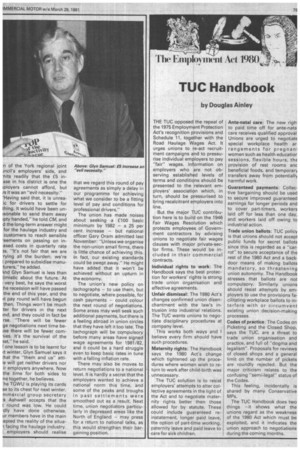TUC Handbook
Page 81

If you've noticed an error in this article please click here to report it so we can fix it.
by Douglas Ainley
THE TUC opposed the repeal of the 1975 Employment Protection Act's recognition provisions and Schedule 11, together with the Road Haulage Wages Act. It urges unions to re-act recruitment campaigns and to pressurise individual employers to pay "fair" wages. Information on employers who pre not observing established levels of terms and conditions should be presented to the relevant employers' association which, in turn, should be pressurised to bring recalcitrant employers into line.
But the major TUC contribution here is to build on the 1946 Fair Wages Resolution which protects employees of Government contractors by advising unions to negotiate fair wages clauses with major private-sector firms. These would be included in their commercial contracts.
Individual rights to work: The Handbook says the best protection for workers' rights is strong trade union organisation and effective agreements.
Unfair dismissal: The 1980 Act's changes confirmed union disenchantment with the law's intrusion into industrial relations. The TUC wants unions to negotiate disciplinary procedures at company level.
This works both ways and I believe every firm should have such procedures.
Maternity rights: The Handbook says the 1980 Act's change which tightened up the procedures where women wish to return to work after child-birth was unnecessary.
The TUC solution is to resist employers' attempts to alter collective agreements in the light of the Act and to negotiate maternity rights better then those allowed for by statute. These could include guaranteed reinstatement, longer paid leave, the option of part-time working, paternity leave and paid leave to care for sick children. Ante-natal care: The new righ: to paid time off for ante-nata care receives qualified approval Unions are urged to negotiate special workplace health ar rangements for pregnani women such as health eclucatior sessions, flexible hours, the provision of rest rooms anc beneficial foods, and temporary transfers away from potentially harmful work.
Guaranteed payments: Collective bargaining should be used to secure improved guaranteed earnings for longer periods and to cover part-timers, workers laid off for less than one day, and workers laid off owing to industrial action.
Trade union ballots: TUC policy is that unions should not accept public funds for secret. ballots since this is regarded as a "carrot" to secure acceptance of the rest of the 1980 Act and a backdoor means of making ballots mandatory, so threatening union autonomy. The Handbook stresses that ballots are not compulsory. Similarly unions should resist attempts by employers to use the provisions facilitating workplace ballots to interfere with or circumvent existing union decision-making processes.
Codes of practice: The Codes on Picketing and the Closed Shop, says the TUC, are a threat to trade union organisation and practice, and full of "dogma and legalism". Proposals for reviews of closed shops and a general limit on the number of pickets are roundly rejected. But the major criticism relates to the confusing "semi-legal" status of the Codes.
This feeling, incidentally is shared by many Conservative MPs.
The TUC Handbook does two things —it shows what the unions regard as the weakness of the 1980 Act which must be exploited, and it indicates the union approach to negotiations during the cooling months.
























































































































